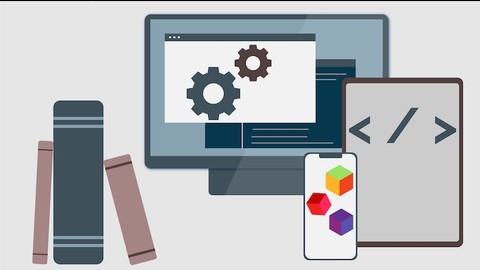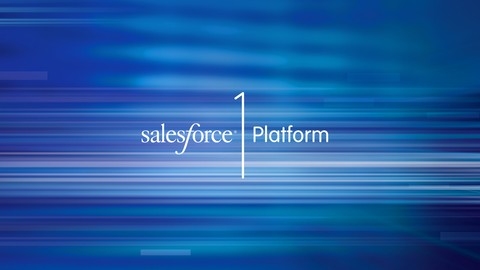Salesforce development is a hot skill in today’s job market.
As the world’s leading CRM platform, Salesforce offers a robust ecosystem for building custom applications, automating workflows, and extending the platform’s functionality.
By learning Salesforce development, you can open doors to a lucrative career path and contribute to innovative solutions for businesses of all sizes.
Whether you’re interested in building custom applications, integrating with external systems, or automating complex business processes, mastering Salesforce development can empower you to make a real impact.
However, with so many Salesforce development courses available on Udemy, it can be difficult to know where to start.
You want a course that’s comprehensive, engaging, and taught by experienced professionals who can guide you through the intricacies of Apex, Visualforce, Lightning Web Components, and other key technologies.
Finding the right course can be the difference between a frustrating learning experience and a successful journey to becoming a proficient Salesforce developer.
After reviewing numerous options, we’ve identified The Complete Salesforce Development Course as the best overall course for aspiring Salesforce developers on Udemy.
This comprehensive course covers everything from the fundamentals of Apex programming to advanced topics like asynchronous Apex and the Aura framework.
It’s packed with hands-on challenges, real-world projects, and expert instruction, making it the ideal choice for those serious about mastering Salesforce development.
This is just one of the many excellent Salesforce development courses available on Udemy.
We understand that everyone has different learning styles and preferences.
Therefore, we’ve compiled a list of other top-rated courses, each catering to specific needs and skill levels.
Keep reading to discover more options and find the perfect course to launch your Salesforce development journey!
The Complete Salesforce Development Course
This course provides a comprehensive introduction to Salesforce development, covering a wide range of topics from the fundamentals of web applications to advanced concepts like Apex triggers, asynchronous Apex, and the Aura framework.
You will start by learning the basics of web application architecture and the technologies used in Salesforce.
The course then dives into Apex programming, teaching you data types, control flow statements, classes, methods, and exception handling.
You’ll also learn how to write unit tests and work with Salesforce Object Query Language (SOQL) to query data.
As you progress, you’ll explore more advanced topics like DML operations, governor limits, code bulkification, and triggers.
The course includes a “Boss Level Challenge” project that allows you to apply what you’ve learned by building a contact tracing application.
In the later sections, you’ll learn about the Aura framework for building Lightning components, including topics like component lifecycle, events, and integrating with Apex.
The course also covers asynchronous Apex features like future methods, batch Apex, and scheduled Apex.
Throughout the course, you’ll work with hands-on coding challenges and solutions to reinforce your understanding.
The instructor provides step-by-step guidance, and you’ll have access to course resources like code editors and development environments.
Salesforce Development Training for Beginners
You’ll start by learning the fundamentals of programming, including variables, data types, and the Apex syntax used in Salesforce.
Right away, you’ll get hands-on experience setting up your developer environment and using the developer console.
From there, the course dives into core Apex concepts like variables, primitive data types like strings and integers, operators, and conditional statements like if-else and switch.
You’ll then move on to loops, a crucial part of programming that allows you to repeat code blocks.
The course covers different loop types like while loops and for loops, including nested loops.
It also explains how to avoid infinite loops.
Object-oriented programming is covered in-depth, including classes, objects, static vs. non-static methods and variables, access modifiers, inheritance, and constructors.
You’ll learn about collections like lists, sets, and maps for storing and manipulating data.
The course teaches you how to interact with Salesforce data using SObjects and query languages like SOQL and SOSL.
You’ll learn about exceptions and exception handling using try-catch blocks, including built-in exceptions like NullPointerException.
Advanced topics include DML operations for inserting, updating, and deleting data, as well as triggers that automatically execute code based on data changes.
The course explains Apex transactions, batch Apex for processing large data volumes, and Salesforce web services like REST and SOAP.
Finally, you’ll learn how to write Apex test classes for ensuring your code works as expected and achieving sufficient code coverage.
The course emphasizes best practices in Salesforce development throughout.
Salesforce Certified Platform Developer I (LWC & AURA also)
You’ll start by learning the fundamentals of navigating the Salesforce UI, working with objects and fields, and understanding relationships between them.
The course dives deep into automation tools like Workflows, Process Builders, Approval Processes, and Flows, enabling you to streamline business processes efficiently.
You’ll also explore data management techniques, including importing and exporting data using tools like Data Loader and Data Import Wizard.
As you progress, you’ll delve into the world of Apex programming, mastering concepts like variables, data types, conditional statements, loops, collections, classes, and exception handling.
The course covers essential topics like SOQL and SOSL queries, DML statements, database methods, relationship queries, triggers, batch apex, and web services.
Additionally, you’ll gain hands-on experience with Lightning Aura Components and Lightning Web Components (LWC), learning how to build dynamic user interfaces and leverage features like data binding, conditional rendering, and component communication.
The course also covers Visualforce components, providing you with the skills to create custom user interfaces using Visualforce tags and controllers.
Throughout the course, you’ll have opportunities to apply your knowledge through quizzes and practice tests, ensuring a solid understanding of the concepts.
By the end, you’ll be well-equipped to develop robust Salesforce applications, automate business processes, and leverage the power of the Salesforce platform.
Salesforce Developer Training with real-time project
This Salesforce Developer Training course takes you from the fundamentals of Salesforce development to advanced techniques like REST API integration, all while building a real-time Conference Management application.
You will begin by mastering the basics, such as creating custom objects, tabs, and optimizing page layouts using Salesforce’s declarative features.
You will then delve into Apex, Salesforce’s programming language, learning to write code for various tasks.
This includes using SOQL and DML to query, create, update, and delete data.
You will also explore Apex triggers, which automatically execute code based on data changes, adding a dynamic layer to your applications.
Beyond the core concepts, you will explore powerful features like Visualforce, which lets you build dynamic web pages within Salesforce.
You will create custom Visualforce pages, enhance them with JavaScript, and learn about authentication using OAuth and JavaScript Remoting, enabling seamless integration with external services.
The course also covers REST APIs, a crucial technology for connecting Salesforce with other systems.
You will learn to work with JSON and XML data formats and use Workbench, a developer tool, to manage Salesforce data and execute API calls.
Hands-on experience with annotations like @HttpGet, @HttpPost, @HttpPut, and @HttpDelete will equip you to handle different types of requests.
Debugging Salesforce for Admin’s & Developers
This course takes you beyond basic Salesforce administration and into the world of debugging.
You will learn how to use the Developer Console, a powerful tool that lets you see what’s happening behind the scenes in your Salesforce organization.
The course helps you understand how Salesforce processes requests, showing you the steps it takes and the order they happen in.
You will learn how to use the Debug Log, a detailed record of your Salesforce system’s activities, to see what’s happening when your code runs, even when things go wrong.
You’ll learn how to fix errors, but the course also teaches you how to find and address “non-errors.”
These are situations where your code runs but doesn’t behave as you expect.
You will understand how to use Debug Perspectives, which give you different ways to look at the Debug Log, to pinpoint exactly where things are going wrong.
You’ll also work with Advanced Debug Settings to control what information is captured in the logs.
The course teaches you SOQL (Salesforce Object Query Language), a powerful tool for finding and retrieving information within Salesforce.
You will learn how to create and run SOQL queries, how to use them with related records (like child records and related lists), and how to make Aggregate Queries that summarize large amounts of data.
Salesforce Platform Developer Masterclass: Apex & Lightning
This Salesforce Platform Developer Masterclass equips you with the skills to build impressive apps on the Salesforce platform.
You’ll start with Apex, Salesforce’s programming language, and learn to use the Developer Console—your coding hub.
You’ll master data types like Primitives and sObjects, essential for handling information in Salesforce.
Next, you’ll explore DML operations for creating, updating, and deleting data.
SOQL and SOSL, powerful querying languages, will become your go-to tools for finding and manipulating specific data.
You’ll also learn about Triggers, which automate actions based on data changes, making your applications smarter and more efficient.
The course then dives into Apex testing, where you’ll ensure your code is top-notch by writing various test cases.
You’ll then explore Asynchronous Apex, enabling you to run long tasks in the background without slowing down the user experience.
You’ll master techniques like Future Methods, Batch Apex, and Scheduled Apex for optimal performance.
Finally, you’ll learn to create sleek and user-friendly interfaces with Visualforce and Lightning Web Components, giving your apps a professional edge.
Complete Salesforce Certified Platform Developer 1 Course
This Salesforce development course teaches you the skills needed to pass the Salesforce Platform Developer I Certification Exam.
You start with the basics of Salesforce development, such as understanding its multi-tenant environment, which allows multiple businesses to share the same software, and the MVC (Model-View-Controller) architecture, a popular way to organize code.
You’ll then learn how to build basic apps using both clicks (declarative) and code (programmatic).
The course then dives into Apex, Salesforce’s programming language.
You learn to write Apex code to automate business tasks, like updating records automatically when certain conditions are met.
You’ll master SOQL and SOSL, special languages for finding and retrieving data in Salesforce, and learn how to build user interfaces using Visualforce and Lightning Components, which are like building blocks for creating the look and feel of your Salesforce apps.
You will get hands-on experience with important Salesforce development tools.
You’ll use Salesforce DX, which helps organize and manage your code, Salesforce CLI, a command-line interface for interacting with your Salesforce environment, and Developer Console, a built-in tool for writing and testing your code.
The course also covers testing and debugging your code.
You’ll learn to write unit tests, which are like mini-programs that check if your code is working correctly.
Finally, you’ll learn how to deploy, or move, your finished code to different Salesforce environments, such as a testing environment and then to a live environment where users can access it.
Salesforce Development for Intermediate Developers
This course goes beyond the basics to give you real-world skills.
You will build a strong foundation in Salesforce development by setting up your development environment using tools like Visual Studio Code, Salesforce CLI, and Java.
You will learn about the differences between synchronous and asynchronous Apex, diving into important concepts like batch Apex and future methods, equipping you to build efficient and scalable solutions.
The course then explores how to integrate Salesforce with external services, like YouTube, using REST and SOAP web services.
You will gain hands-on experience by building a button that utilizes JavaScript to interact with the YouTube API, demonstrating your newfound integration capabilities.
This part of the course teaches you how to make API calls, understand API keys, and utilize custom settings.
You will also become proficient in writing test classes for your Apex code using the Apex testing framework.
You will learn how to increase code coverage and follow best practices for Salesforce development, ensuring your code is high-quality and functions correctly.
This focus on best practices helps ensure your solutions are maintainable and scalable.
Finally, you will discover powerful Google Chrome extensions designed specifically for Salesforce developers.
Extensions like Salesforce Organizer, Salesforce Colored Fevicon, Salesforce Advance Code Searcher, and Apex PMD will make your workflow smoother and more efficient.
These extensions provide valuable features for code searching, data organization, and visual identification of Salesforce components.








